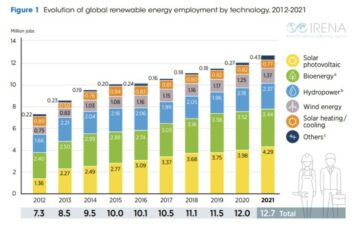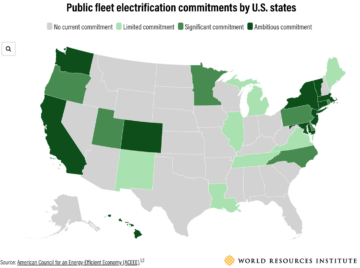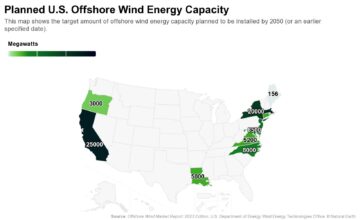
The world’s largest companies are committed to reporting on climate-related risks and opportunities in line with the guidance set out by the influential Taskforce on Climate-related Financial Disclosures (TCFD), but only a handful of corporates have fully embraced climate risk reporting best practices.
That is the headline conclusion of the sixth and final status report from the TCFD, published Thursday, which highlights how there has been “steady momentum” in the number of companies disclosing TCFD-aligned information, but warns “more progress is needed” if corporates and investors are to adequately respond to escalating climate risks.
Established in 2015 by the Financial Stability Board, the TCFD subsequently produced detailed guidelines on how businesses and investors should publicly report on the climate-related risks and opportunities faced by their organization. The guidance called on companies and investors to report on how climate change is affecting both their operations and value chains, and urged boards to model various scenarios detailing how the net zero transition could impact their financial outlook.
The guidelines have become hugely influential and have been incorporated in numerous reporting standards and regulations worldwide.
This summer, the International Sustainability Standards Board (ISSB) released its climate-related and general sustainability-related disclosure standards, which drew heavily on the TCFD’s work. The FSB said the new standards represented the culmination of the Taskforce’s work and announced the group would be disbanded upon release of its 2023 status report.
The new report confirms that 97 of the 100 largest companies in the world have now declared support for the TCFD or report in line with the TCFD recommendations.
Only a small number of corporates are reporting in line with all 11 of the recommendations set out by the TCFD.
However, it also reveals that only a small number of corporates are reporting in line with all 11 of the recommendations set out by the TCFD.
On average for fiscal year 2022, companies reported in line with 5.3 of the Taskforce’s 11 recommended disclosures, up from an average of 3.2 in 2020. Fifty-eight percent of listed companies disclosed in line with at least five of the 11 recommended disclosures — up from 18 percent in 2020. But only four percent disclosed in line with all 11 recommendations.
The report also revealed that the majority of corporates including climate-related financial information in financial filings remains limited, despite the fact the majority of jurisdictions with final or proposed climate-related disclosure requirements specify that disclosures should be reported in financial filings or annual reports. On average for fiscal year 2022, information aligned with the 11 recommended disclosures was four times more likely to be disclosed in sustainability and annual reports than in financial filings.
In addition, the report confirmed similar progress is being made across the investment community. Over 80 percent of the largest asset managers and 50 percent of the largest asset owners reported in line with at least one of the 11 TCFD recommended disclosures. Based on a review of publicly available reports, nearly 70 percent of the top 50 asset managers and 36 percent of the top 50 asset owners disclosed in line with at least five of the recommended disclosures.
“This final report makes clear that we’ve made tremendous strides in bringing greater transparency to financial markets for both climate related-risks and opportunities,” said Michael Bloomberg, chair of the Task Force and founder of Bloomberg L.P. and Bloomberg Philanthropies. “While there is still much more work to do, this progress provides the forward momentum necessary to more fully integrate climate data into the global economy and spur more private investment in clean energy.”
In the report, the TCFD urged standards bodies, regulators, investors, and corporates to build on its work and continue to provide guidance to ensure businesses are preparing for a range of climate and decarbonization scenarios.
It also called for further consideration to be given to “decision-useful disclosure on other sustainability topics — such as biodiversity, water, and social issues .”
The majority of corporates including climate-related financial information in financial filings remains limited.
And it recommended that work continues to ensure interoperability of the ISSB standards with regional and jurisdictional frameworks, so as to support consistent company reporting, and deliver implementation guidance on related topics like climate-related physical risk assessment and adaptation planning, climate-related scenario analysis at a sector or industry level, and Scope 3 emissions measurement.
Finally, it called for the development of a climate-related financial disclosure framework for use by countries and other sovereign entities, “as consistent sovereign disclosure would support companies’ in preparing comprehensive climate-related financial disclosure.”
Denise Pavarina, TCFD vice chair and senior adviser at DPP Intermediação de Negócios, said TCFD reporting promised to unlock multiple benefits for businesses and investors.
“Climate-related financial disclosures are the compass guiding businesses through uncharted waters — and the TCFD has been a leader in this regard,” she said. “Embracing transparency and disclosure isn’t just a matter of compliance; it’s a strategic necessity for businesses to thrive in the face of uncertainty. We are proud of the progress made by TCFD in this endeavor.”
Her comments were echoed by Graeme Pitkethly, TCFD vice chair and chief financial officer at Unilever, who said TCFD “has emerged as a beacon of clarity in an era of unprecedented environmental challenges”.
“Its importance lies not just in the numbers and reports, but in the transformative power it unleashes upon businesses and industries worldwide,” he said. “By providing a common language for disclosing climate risks and opportunities, the TCFD has enabled companies to navigate the complexities of a rapidly changing world, fostering resilience, and unlocking sustainable growth.”
- SEO Powered Content & PR Distribution. Get Amplified Today.
- PlatoData.Network Vertical Generative Ai. Empower Yourself. Access Here.
- PlatoAiStream. Web3 Intelligence. Knowledge Amplified. Access Here.
- PlatoESG. Carbon, CleanTech, Energy, Environment, Solar, Waste Management. Access Here.
- PlatoHealth. Biotech and Clinical Trials Intelligence. Access Here.
- Source: https://www.greenbiz.com/article/tcfd-97-worlds-100-largest-corporations-back-climate-disclosure-guidelines
- :has
- :is
- :not
- ][p
- $UP
- 100
- 11
- 2015
- 2020
- 2022
- 2023
- 36
- 50
- 70
- 80
- 97
- a
- across
- adaptation
- addition
- adequately
- adviser
- affecting
- aligned
- All
- also
- an
- analysis
- and
- announced
- annual
- ARE
- AS
- assessment
- asset
- asset-managers
- At
- available
- average
- back
- based
- BE
- beacon
- become
- been
- being
- benefits
- BEST
- best practices
- Bloomberg
- board
- bodies
- both
- Bringing
- build
- businesses
- but
- by
- called
- chains
- Chair
- challenges
- change
- changing
- chief
- chief financial officer
- clarity
- clean energy
- clear
- Climate
- Climate change
- comments
- committed
- Common
- community
- Companies
- company
- Compass
- complexities
- compliance
- comprehensive
- conclusion
- CONFIRMED
- consideration
- consistent
- continue
- continues
- corporates
- Corporations
- could
- countries
- data
- de
- decarbonization
- deliver
- Despite
- detailed
- Detailing
- Development
- Disclosing
- disclosure
- Disclosures
- do
- echoed
- economy
- embraced
- embracing
- emerged
- Emissions
- enabled
- endeavor
- energy
- ensure
- entities
- environmental
- Era
- Ether (ETH)
- Face
- faced
- fact
- filings
- final
- financial
- financial information
- financial stability
- Financial Stability Board
- Fiscal
- five
- For
- Force
- Forward
- fostering
- founder
- four
- Framework
- frameworks
- from
- fsb
- fully
- further
- General
- given
- Global
- Global economy
- greater
- Group
- Growth
- guidance
- guidelines
- handful
- Have
- he
- headline
- heavily
- highlights
- How
- HTTPS
- Hugely
- if
- Impact
- implementation
- importance
- in
- Including
- Incorporated
- industries
- industry
- Influential
- information
- integrate
- International
- Interoperability
- into
- investment
- Investors
- isn
- issues
- IT
- ITS
- jurisdictions
- just
- language
- largest
- leader
- least
- Level
- lies
- like
- likely
- Limited
- Line
- Listed
- made
- Majority
- MAKES
- Managers
- Markets
- Matter
- measurement
- Michael
- model
- Momentum
- more
- much
- multiple
- Navigate
- nearly
- necessary
- necessity
- needed
- net
- New
- now
- number
- numbers
- numerous
- of
- Officer
- on
- ONE
- only
- Operations
- opportunities
- or
- organization
- Other
- out
- Outlook
- over
- owners
- percent
- physical
- planning
- plato
- Plato Data Intelligence
- PlatoData
- power
- practices
- preparing
- private
- Produced
- Progress
- promised
- proposed
- proud
- provide
- provides
- providing
- publicly
- published
- range
- rapidly
- recommendations
- recommended
- regard
- regional
- regulations
- Regulators
- related
- release
- released
- remains
- report
- Reported
- Reporting
- Reports
- represented
- Requirements
- resilience
- Respond
- Revealed
- Reveals
- review
- Risk
- risk assessment
- risks
- s
- Said
- scenario
- scenarios
- scope
- sector
- senior
- set
- she
- should
- similar
- sixth
- small
- So
- Social
- social issues
- sovereign
- Stability
- standards
- Status
- steady
- Still
- Strategic
- strides
- Subsequently
- such
- summer
- support
- Sustainability
- sustainable
- Sustainable Growth
- T
- Task
- task force
- taskforce
- than
- that
- The
- the world
- their
- There.
- this
- Thrive
- Through
- thursday
- times
- to
- top
- Topics
- transformative
- transition
- Transparency
- tremendous
- Uncertainty
- uncharted
- unilever
- unleashes
- unlock
- unlocking
- unprecedented
- upon
- use
- value
- various
- Ve
- vice
- Warns
- was
- Water
- Waters
- we
- were
- which
- while
- WHO
- with
- Work
- world
- worldwide
- would
- year
- zephyrnet
- zero










